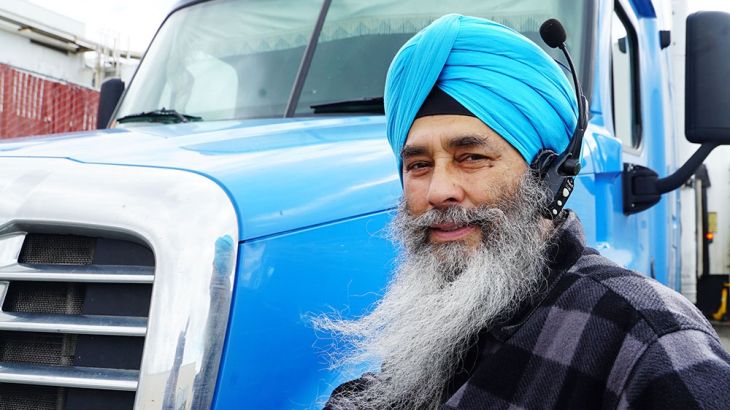Trucking and the Indians hoping to cross the US-Mexico border
In the latest of its Untold America series, AJ+ hops in the cab of an 18-wheeler belonging to Satnam Singh, a Punjabi Sikh immigrant, who came to the US 40 years ago.

San Francisco, California – For decades, Indian nationals have been making long journeys to reach the US-Mexico border. In some detention facilities in California, up to 40 percent of the people being held are reportedly from India, according to government data from last year.
Immigrants and asylum seekers from India travel more than 9,000 miles (14,484km) with paid “agents” who guide them on a route that snakes through multiple countries before reaching Mexico. In the first four months of 2018, there were 4,197 Indian nationals arrested by US Customs and Border Patrol. Some asylum seekers have told us they fled political and religious persecution in India.
Keep reading
list of 4 itemsAt least 23 people missing off Tunisia coast, authorities say
Lebanon’s economic crisis endures, as does the EU’s ‘fear’ of refugees
UN urges US to stop forced returns to Haiti after latest deportation flight
Satnam Singh, a Punjabi Sikh immigrant, made the journey in 1979. He worked and travelled through seven countries before reaching the US-Mexico border and ultimately crossed into the United States by swimming across the Rio Grande. “That night I’ve never forgotten,” he told us earlier this year.
Today, Singh works as a truck driver, like thousands of fellow Sikh Americans.
Making inroads in the US
After receiving work authorisation, many immigrants and asylum seekers are drawn to truck driving because it offers drivers the chance to do work that doesn’t require full English proficiency or a lot of start-up capital. It is also accessible. Aspiring truck drivers typically attend trucking school, obtain a commercial driver’s license and pair with a more experienced driver to practice handling the truck.
Trucking is particularly popular among Sikhs. In the past two years, 30,000 Punjabi Sikhs have reportedly entered the industry. Nationwide, there are Punjabi-owned truck driving schools, companies, truck stops and Punjabi language resources on the industry. Roadside restaurants serving Punjabi food, dhaba, common in India and Pakistan, are also common along interstates in the US.
In our latest AJ+ Untold America series on the Indian American community, we focus on Punjabi Sikh truckers. We join Singh along his trucking route, and experience a day in his life on the road. In the cab of the truck, we hear Satnam’s story of migration, how he spent the first few months in the US in a detention centre. He eventually received a green card.
As a practising Sikh, Singh covers his hair with a turban. He’s experienced outward hostility in the decades he has lived in the US, which he attributes to lack of education. If Americans knew about Sikhism, that the religion has equality and justice in its foundation, he says, maybe the hate would stop.
He also doesn’t dwell on it. Staying cheerful and upbeat, Singh is proud of what he has accomplished as an American citizen, and the Sikh community’s legacy in his hometown of Yuba City in northern California. The city is known as Little Punjab where Sikh contributions stretch back more than a century. That history is not without conflict. Back in 1908, Punjabis were driven out of neighbouring Marysville during a spike in hostility against Asian immigrants. In 1923, the US Supreme Court revoked citizenship and landowning rights of Indian men. And the following year, immigrants from Asia were blocked from immigrating to the US entirely.
Today, there is no shortage of hate crimes against Sikh Americans. But the community doesn’t waver. Gurdwaras (or Sikh temples) remain open to all. Sikhs still serve free food to their neighbours through langar (the community kitchen) and tirelessly educate their brothers and sisters in the US.
More from AJ+’s Untold America: My big fat Indian wedding
In the first episode of this series, we followed young Indian American engaged couples who often face a tough choice: Either strictly adhere to the traditional expectations of there parents, or modernise their ceremony: